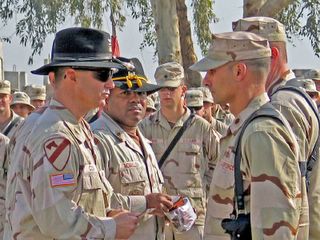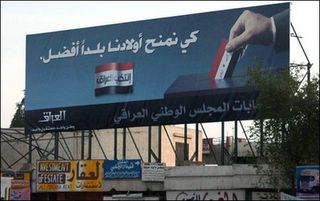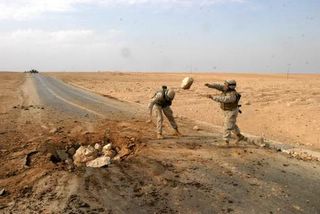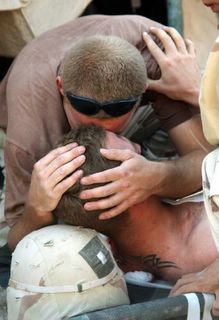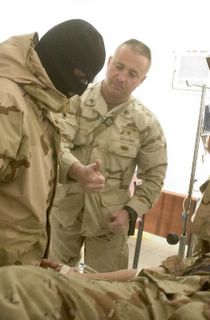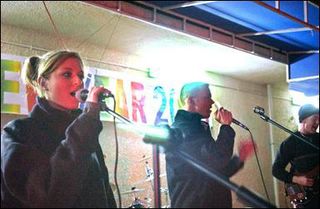30 January 2005

Maj. Gen. Peter Chiarelli, commanding general, 1st Cavalry Division, pins a Bronze Star Medal on Master Sgt. John McCauslin, Headquarters Support Company, 411th Engineer Battalion. McCauslin was one of 20 Soldiers representing the five battalions that fall under the divisions Engineer Brigade who received BSMs during an end-of-tour award ceremony held at Camp Liberty. Pic by Sgt. Dan Purcell

29 January 2005

Maj. Gen. Eric T. Olson, commander of the 25th Infantry Division, addresses troops at Kirkuk Air Base, Iraq, prior to their departure to Mosul, where they will provide security for the Iraqi elections. Olson also traveled to seven forward operating bases in Iraq to speak with Soldiers. Pic by Sgt. Sean Kimmons..

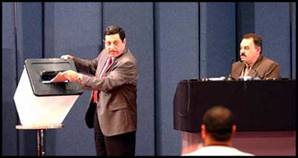
Dr. Farid Ayar (left) and Mr. Ez Al Deem Al Mohammady, both members of the International Election Committee Iraq, demonstrate the voting process during a press conference concerning the Jan. 30, 2005, Iraqi elections. The press conference took place on Jan. 25, 2005, at the Baghdad Convention Center. Pic by Master Sgt. Dave Ahlschwede, U.S. Air Force.


Marine Lance Cpl. Luis Molina scans an Iraqi citizen's retina at Brahma Park in Fallujah, Iraq, on Jan 25, 2005. U.S. Marines are utilizing a Biometric Analysis Tracking System to record and identify Iraqi civilians entering the battle torn city of Fallujah in an attempt to find and identify insurgent forces. The tracking system uses thumbprints, a photograph of the face, and a retinal scan to establish positive identity. Molina is deployed with Marine Wing Support Squadron 373 in support of Operation Iraqi Freedom. Pic by SSG Jonathan C. Knauth, U.S. Marine Corps.

26 January 2005

Capt. Elizabeth Willett, a 5th Brigade Combat Team civil affairs officer, sits next to Sued as Ali, a contractor working with the brigade, talks with the girls father about getting the surgery for her needed to return her eyesight. Shortly afterwards - she receives the assistance from the Army to do the operation. Photo by Spc. Al Barrus,

23 January 2005
Suicide Barbie
American Forces Press Service
BAGHDAD, Iraq, Jan. 22, 2005 – Jim Garamone has traveled in Iraq since early January, covering the many news aspects about multinational and Iraqi security forces' efforts in preparation for upcoming Jan. 30 elections. During his travels, he's come upon interesting aspects of life in Iraq.
"Suicide Barbie"
If you want the latest DVDs, just go to the local souk, or market. Iraqi entrepreneurs have found lucrative business opportunities to pirate videos, games and software. But you'd be surprised about what you find. Such is the case with what soldiers here call "Suicide Barbie." It's the typical brand-named computer game – featuring the likes of Cinderella Barbie or Sleeping Beauty Barbie – except for the cover picturing Barbie wearing a suicide vest.
Soldiers here hope this is just a sick joke, but they fear it could be an insidious way to influence a new generation.
Iraqi Women and the Hijab
In 2003, roughly half of Iraqi women wore hijabs – loose clothing topped by a type of scarf worn around the head and under the chin. Today, almost all do. In fact, in public it is strange to see women without them.
In Baghdad's protected International Zone, many Iraqi women do not wear the hijab. But about 30 miles away in Baqubah during a Peace Day ceremony, all the women sat in the back of the room and all wore hijabs.
"I don't know what this says about changes in Iraqi society," a State Department official said. "We have noticed that women are speaking out more, and seem to be the most outspoken against the insurgents."
An Iraqi embassy employee said Baghdadis have always been more cosmopolitan than the rest of the country. Still, he said women are wearing the hijab almost in self-defense. "If they do not wear it, it calls attention," he said. "Not wearing it is like a political statement."
Parties and Politics
One surprise of a recent poll is the number of Iraqis who say they discuss politics at home or follow a particular political party. More than half – 54 percent – of all Iraqis surveyed said they never talk about politics with other people. An verwhelming 88 percent said they would never join a political party. "After the experience with Saddam Hussein's Baath Party, would you join any political party?" an Iraqi officer in Mosul asked.
"Getting the Iraqis to trust their government is important," said a Multinational Force Iraq official. "They need to see the government working effectively and actually listening to their concerns before they will believe."
Who Is an Iraqi?
From reading the newspapers or listening to television, you would think there are only Arabs and Kurds living in Iraq. That's not the case. Arabs and Kurds make up the largest proportion of the population, but there are many other ethnicities. There are Turks, Kildanians and Assyrians in Iraq.
The media stress differences between Shiia and Sunni Muslims. The percentage most often heard is 60 percent of the population is Shiia and 20 percent Sunni. But the Kurds are Sunni Muslims, yet they are not caught up in the struggle for power between Shiia and Sunni Arabs. Plus, between 600,000 and 700,000 Christians live in Iraq.
Not all Kurds want their own homeland. Not all Shiia want an Iranian-style theocracy. Not all Sunnis are opposed to the coalition, officials said. Shadings of beliefs exist among all Iraqi groups. Understanding the differences is a task decision makers face.
22 January 2005
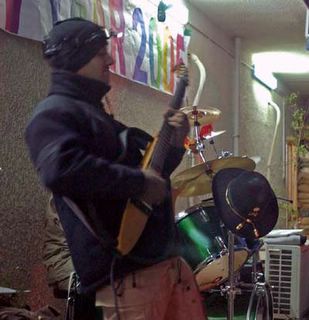
CAMP TAJI, Iraq -- It isnt money or fame that brings them together, nor is it the lure of big lights and raucous parties. On the front lines of a combat zone, 20 miles north of the Iraqi capital, seven Soldiers have come together for one reason alone -- to make rock and roll.
Since their first performance at a Soldiers recreational facility in September 2004, the seven-member band, Last Ditch Effort, have gone from humble beginnings to the rock and roll force they are today.
Its the last day of 2004. The U.S. Armys 1st Cavalry Divisions Aviation Brigade, the 4th Brigade Combat Team, are holding one last party to say goodbye to the year. As headliners for the evening, Last Ditch Effort is tuning its instruments and getting its gear together. Curtis Hoehn, the bass player, starts laying down a rhythmic blues groove. The thump-de-thump-de-thump-de-thumpity-thump of the bass line stops the crowd in its tracks, heads start bobbing in time, bodies start catching the groove. Chief Warrant Officer Chad Griffin picks up his guitar and begins a melodic counter to Hoenhs driving attack. A years worth of deployment blues flow out of Griffins Telecaster copy. Each life lost echoed in the gentle bend of a string, the year passed phrased in a slow mournful arpeggio down the neck. The crowd is hooked. Slinking behind his kit, Maj. David Toon picks up the rhythm and follows Hoehns lead as they make for a one-two punch on the rhythm section. With a final flourish, the threesome brings the impromptu warm up to an end. The crowd goes nuts cheering them on for one more, but theyll just have to wait.
It wasnt always this way. Six months ago if you would have said Last Ditch Effort, very few -- if anyone -- would have known who you were talking about. By Cpl. Benjamin Cossel, 122nd Mobile Public Affairs Detachment

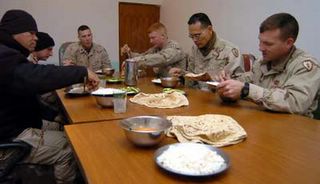
There has been some delight in this winter season, though. While on a Jan. 11 patrol of Iraqi border control points in the Meshla Mountains, Team 3 Soldiers were treated to a few inches of snow.
The team followed a Halabja DBE vehicle up slushy mountain roads to more than 2,500 feet in elevation. The last border control point they traveled to was less than one mile from the Iraq and Iran border.
Next month, these Kurdish experiences will be a thing of the past for Team 3 Soldiers when they redeploy back to Hawaii. However, theyll still be able to reflect on these memories.
Its been a very good experience interacting with the Kurdish soldiers and seeing how they live. Maybe, we can appreciate more of what we have than what the people have out here, Heanu said. By Sgt. Sean Kimmons, 25th Ist Infantry Division.

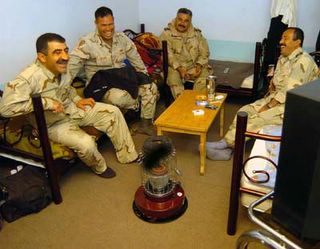
Friends are easy to come by with the Kurdish, because overall they are friendly, said Spc. Nick Wegner, a M249 squad automatic weapon gunner with Team 3.
Wegner also feels that working with the Kurds makes his teams mission unlike any other Army mission in Iraq.
Our experiences are completely different than probably anybody in the Army as far as this country goes, Wegner said. Not too many people get to work with the more peaceful people of Iraq in the most peaceful portion of Iraq.
One of the teams experiences has been a learning one. Its been a fun learning experience, Wegner said. We each learned a good portion of their language and weve taught them pieces of ours.
Heanu, who is a mechanic with Team 3, can always be found chatting with the Iraqi border guards in Kurdish.
Im a people person, he said.
Besides the fact that hes talkative, Heanu intermingles with the Kurds since they remind him of his own people -- the Hawaiians.
Their culture is almost the same as Hawaiian, Heanu said. The Hawaiian people have a lot of respect for the people, just like the Kurdish people. They are very welcoming.
Heanu has even participated in many Kurdish daily life routines that are different than in Papakolea, where he is from on Oahu.
He has helped butcher a lamb with Iraqi border guards, cut off the heads of live chickens and cooked Kurdish wheat bread inside a stove made of stone.
Team 3 Soldiers also endure the colder weather that chills this part of Iraq. There are no central heating units built into the buildings, only a kerosene heater the Soldiers huddle around for warmth. And forget about any chances of a warm shower.

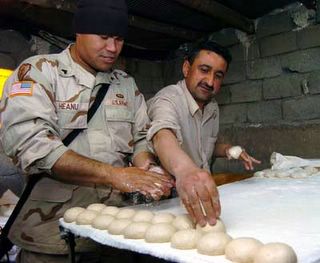
HALABJA, Iraq -- Chonit? Sgt. Nolan Heanu said to an Iraqi border guard who was standing in the cool crisp mountain air outside Halabja Districts Department of Border Enforcement headquarters.
With a joyful smile, the guard returned the greeting meaning, how are you in Kurdish.
Heanu then proceeded into the headquarters along with other Soldiers from Headquarters and Headquarters Service Battery, Task Force 2-11 Field Artillery, where they were overwhelmed by other Iraqi guards speaking in Kurdish.
In seconds, hot Chai tea served in tiny glasses was making its way to all the Soldiers who just drove two hours from Forward Operating Base Kalsu.
The visit was part of a recent border patrol mission that the Soldiers, or Border Patrol Team 3, conducts on a weekly basis. The missions take them either into the predominantly Kurdish districts of Halabja or Darbandikhan, where they reside for a few days at each of the districts DBE headquarters before returning to FOB Kalsu.
In those few days, Team 3 Soldiers help ensure security is tight along the desolate Iraq and Iran border by training and assessing Iraqi border guards. They also get the opportunity to see and partake in the Kurdish way of life during that time.
Whether its eating Kurdish food prepared by Iraqi border guards, speaking Kurdish or enjoying the mountainous landscape of the Kurdish countryside near the border, all Team 3 Soldiers have done it.


Iraqi Prime Minister Iyad Allawi holds a press briefing at Baghdad International Airport to officially announce the reactivation of Iraqi Air Force Squadron 23 on Jan. 19, 2005. Three C-130E cargo planes were recently gifted to the squadron by the United States in an effort to jump-start Iraqi airlift capabilities. Photo by Staff Sgt. Angelique Perez, U.S. Air Force.

19 January 2005
Army LTC Talks About Biased American Media
Editors' Note: LTC Tim Ryan is Commander, Task Force 2-12 Cavalry, First Cavalry Division in Iraq. He led troops into battle in Fallujah late last year and is now involved in security operations for the upcoming elections. He wrote the following during "down time" after the Fallujah operation. His views are his own.
All right, I've had enough. I am tired of reading distorted and grossly exaggerated stories from major news organizations about the "failures" in the war in Iraq. "The most trusted name in news" and a long list of others continue to misrepresent the scale of events in Iraq. Print and video journalists are covering only a fraction of the events in Iraq and, more often than not, the events they cover are only negative.
The inaccurate picture they paint has distorted the world view of the daily realities in Iraq. The result is a further erosion of international support for the United States' efforts there, and a strengthening of the insurgents' resolve and recruiting efforts while weakening our own. Through their incomplete, uninformed and unbalanced reporting, many members of the media covering the war in Iraq are aiding and abetting the enemy.
The fact is the Coalition is making steady progress in Iraq, but not without ups and downs. So why is it that no matter what events unfold, good or bad, the media highlights mostly the negative aspects of the event? The journalistic adage, "If it bleeds, it leads," still applies in Iraq, but why only when it's American blood?
As a recent example, the operation in Fallujah delivered an absolutely devastating blow to the insurgency. Though much smaller in scope, clearing Fallujah of insurgents arguably could equate to the Allies' breakout from the hedgerows in France during World War II. In both cases, our troops overcame a well-prepared and solidly entrenched enemy and began what could be the latter's last stand. In Fallujah, the enemy death toll has exceeded 1,500 and still is climbing. Put one in the win column for the good guys, right? Wrong. As soon as there was nothing negative to report about Fallujah, the media shifted its focus to other parts of the country.
More recently, a major news agency's website lead read: "Suicide Bomber Kills Six in Baghdad" and "Seven Marines Die in Iraq Clashes." True, yes. Comprehensive, no. Did the author of this article bother to mention that Coalition troops killed 50 or so terrorists while incurring those seven losses? Of course not. Nor was there any mention about the substantial progress these offensive operations continue to achieve in defeating the insurgents. Unfortunately, this sort of incomplete reporting has become the norm for the media, whose poor job of presenting a complete picture of what is going on in Iraq borders on being criminal.
Much of the problem is about perspective, putting things in scale and balance. What if domestic news outlets continually fed American readers headlines like: "Bloody Week on U.S. Highways: Some 700 Killed," or "More Than 900 Americans Die Weekly from Obesity-Related Diseases"? Both of these headlines might be true statistically, but do they really represent accurate pictures of the situations? What if you combined all of the negatives to be found in the state of Texas and used them as an indicator of the quality of life for all Texans? Imagine the headlines: "Anti-law Enforcement Elements Spread Robbery, Rape and Murder through Texas Cities." For all intents and purposes, this statement is true for any day of any year in any state. True — yes, accurate — yes, but in context with the greater good taking place — no! After a year or two of headlines like these, more than a few folks back in Texas and the rest of the U.S. probably would be ready to jump off of a building and end it all. So, imagine being an American in Iraq right now.
From where I sit in Iraq, things are not all bad right now. In fact, they are going quite well. We are not under attack by the enemy; on the contrary, we are taking the fight to him daily and have him on the ropes. In the distance, I can hear the repeated impacts of heavy artillery and five-hundred-pound bombs hitting their targets. The occasional tank main gun report and the staccato rhythm of a Marine Corps LAV or Army Bradley Fighting Vehicle's 25-millimeter cannon provide the bass line for a symphony of destruction. As elements from all four services complete the absolute annihilation of the insurgent forces remaining in Fallujah, the area around the former insurgent stronghold is more peaceful than it has been for more than a year.
The number of attacks in the greater Al Anbar Province is down by at least 70-80 percent from late October — before Operation Al Fajar began. The enemy in this area is completely defeated, but not completely gone. Final eradication of the pockets of insurgents will take some time, as it always does, but the fact remains that the central geographic stronghold of the insurgents is now under friendly control. That sounds a lot like success to me. Given all of this, why don't the papers lead with "Coalition Crushes Remaining Pockets of Insurgents" or "Enemy Forces Resort to Suicide Bombings of Civilians"? This would paint a far more accurate picture of the enemy's predicament over here. Instead, headlines focus almost exclusively on our hardships.
What about the media's portrayal of the enemy? Why do these ruthless murderers, kidnappers and thieves get a pass when it comes to their actions? What did the the media show or tell us about Margaret Hassoon, the director of C.A.R.E. in Iraq and an Iraqi citizen, who was kidnapped, brutally tortured and left disemboweled on a street in Fallujah? Did anyone in the press show these images over and over to emphasize the moral failings of the enemy as they did with the soldiers at Abu Ghuraib? Did anyone show the world how this enemy had huge stockpiles of weapons in schools and mosques, or how he used these protected places as sanctuaries for planning and fighting in Fallujah and the rest of Iraq? Are people of the world getting the complete story? The answer again is no! What the world got instead were repeated images of a battle-weary Marine who made a quick decision to use lethal force and who immediately was tried in the world press. Was this one act really illustrative of the overall action in Fallujah? No, but the Marine video clip was shown an average of four times each hour on just about every major TV news channel for a week. This is how the world views our efforts over here and stories like this without a counter continually serve as propaganda victories for the enemy. Al Jazeera isn't showing the film of the C.A.R.E. worker, but is showing the clip of the Marine. Earlier this year, the Iraqi government banned Al Jazeera from the country for its inaccurate reporting. Wonder where they get their information now? Well, if you go to the Internet, you'll find a web link from the Al Jazeera home page to CNN's home page. Very interesting.
The operation in Fallujah is only one of the recent examples of incomplete coverage of the events in Iraq. The battle in Najaf last August provides another. Television and newspapers spilled a continuous stream of images and stories about the destruction done to the sacred city, and of all the human suffering allegedly brought about by the hands of the big, bad Americans. These stories and the lack of anything to counter them gave more fuel to the fire of anti-Americanism that burns in this part of the world. Those on the outside saw the Coalition portrayed as invaders or oppressors, killing hapless Iraqis who, one was given to believe, simply were trying to defend their homes and their Muslim way of life.
Such perceptions couldn't be farther from the truth. What noticeably was missing were accounts of the atrocities committed by the Mehdi Militia — Muqtada Al Sadr's band of henchmen. While the media was busy bashing the Coalition, Muqtada's boys were kidnapping policemen, city council members and anyone else accused of supporting the Coalition or the new government, trying them in a kangaroo court based on Islamic Shari'a law, then brutally torturing and executing them for their "crimes." What the media didn't show or write about were the two hundred-plus headless bodies found in the main mosque there, or the body that was put into a bread oven and baked. Nor did they show the world the hundreds of thousands of mortar, artillery and small arms rounds found within the "sacred" walls of the mosque. Also missing from the coverage was the huge cache of weapons found in Muqtada's "political" headquarters nearby. No, none of this made it to the screen or to print. All anyone showed were the few chipped tiles on the dome of the mosque and discussion centered on how we, the Coalition, had somehow done wrong. Score another one for the enemy's propaganda machine.
Now, compare the Najaf example to the coverage and debate ad nauseam of the Abu Ghuraib Prison affair. There certainly is no justification for what a dozen or so soldiers did there, but unbalanced reporting led the world to believe that the actions of the dozen were representative of the entire military. This has had an incredibly negative effect on Middle Easterners' already sagging opinion of the U.S. and its military. Did anyone show the world images of the 200 who were beheaded and mutilated in Muqtada's Shari'a Law court, or spend the next six months talking about how horrible all of that was? No, of course not. Most people don't know that these atrocities even happened. It's little wonder that many people here want us out and would vote someone like Muqtada Al Sadr into office given the chance — they never see the whole truth. Strange, when the enemy is the instigator the media does not flash images across the screens of televisions in the Middle East as they did with Abu Ghuraib. Is it because the beheaded bodies might offend someone? If so, then why do we continue see photos of the naked human pyramid over and over?
So, why doesn't the military get more involved in showing the media the other side of the story? The answer is they do. Although some outfits are better than others, the Army and other military organizations today understand the importance of getting out the story — the whole story — and trains leaders to talk to the press. There is a saying about media and the military that goes: "The only way the media is going to tell a good story is if you give them one to tell." This doesn't always work as planned. Recently, when a Coalition spokesman tried to let TV networks in on opening moves in the Fallujah operation, they misconstrued the events for something they were not and then blamed the military for their gullibility. CNN recently aired a "special report" in which the cable network accused the military of lying to it and others about the beginning of the Fallujah operation. The incident referred to took place in October when a Marine public affairs officer called media representatives and told them that an operation was about to begin. Reporters rushed to the outskirts of Fallujah to see what they assumed was going to be the beginning of the main attack on the city. As it turned out, what they saw were tactical "feints" designed to confuse the enemy about the timing of the main attack, then planned to take place weeks later.
Once the network realized that major combat operations wouldn't start for several more weeks, CNN alleged that the Marines had used them as a tool for their deception operation. Now, they say they want answers from the military and the administration on the matter. The reality appears to be that in their zeal to scoop their competition, CNN and others took the information they were given and turned it into what they wanted it to be. Did the military lie to the media: no. It is specifically against regulations to provide misinformation to the press. However, did the military planners anticipate that reporters would take the ball and run with it, adding to the overall deception plan? Possibly. Is that unprecedented or illegal? Of course not.
CNN and others say they were duped by the military in this and other cases. Yet, they never seem to be upset by the undeniable fact that the enemy manipulates them with a cunning that is almost worthy of envy. You can bet that terrorist leader Abu Musab Al Zarqawi has his own version of a public affairs officer and it is evident that he uses him to great effect. Each time Zarqawi's group executes a terrorist act such as a beheading or a car bomb, they have a prepared statement ready to post on their website and feed to the press. Over-eager reporters take the bait, hook, line and sinker, and report it just as they got it.
Did it ever occur to the media that this type of notoriety is just what the terrorists want and need? Every headline they grab is a victory for them. Those who have read the ancient Chinese military theorist and army general Sun Tzu will recall the philosophy of "Kill one, scare ten thousand" as the basic theory behind the strategy of terrorism. Through fear, the terrorist can then manipulate the behavior of the masses. The media allows the terrorist to use relatively small but spectacular events that directly affect very few, and spread them around the world to scare millions. What about the thousands of things that go right every day and are never reported? Complete a multi-million-dollar sewer project and no one wants to cover it, but let one car bomb go off and it makes headlines. With each headline, the enemy scores another point and the good-guys lose one. This method of scoring slowly is eroding domestic and international support while fueling the enemy's cause.
I believe one of the reasons for this shallow and subjective reporting is that many reporters never actually cover the events they report on. This is a point of growing concern within the Coalition. It appears many members of the media are hesitant to venture beyond the relative safety of the so-called "International Zone" in downtown Baghdad, or similar "safe havens" in other large cities. Because terrorists and other thugs wisely target western media members and others for kidnappings or attacks, the westerners stay close to their quarters. This has the effect of holding the media captive in cities and keeps them away from the broader truth that lies outside their view. With the press thus cornered, the terrorists easily feed their unwitting captives a thin gruel of anarchy, one spoonful each day. A car bomb at the entry point to the International Zone one day, a few mortars the next, maybe a kidnapping or two thrown in. All delivered to the doorsteps of those who will gladly accept it without having to leave their hotel rooms — how convenient.
The scene is repeated all too often: an attack takes place in Baghdad and the morning sounds are punctuated by a large explosion and a rising cloud of smoke. Sirens wail in the distance and photographers dash to the scene a few miles away. Within the hour, stern-faced reporters confidently stare into the camera while standing on the balcony of their tenth-floor Baghdad hotel room, their back to the city and a distant smoke plume rising behind them. More mayhem in Gotham City they intone, and just in time for the morning news. There is a transparent reason why the majority of car bombings and other major events take place before noon Baghdad-time; any later and the event would miss the start of the morning news cycle on the U.S. east coast. These terrorists aren't stupid; they know just what to do to scare the masses and when to do it. An important key to their plan is manipulation of the news media. But, at least the reporters in Iraq are gathering information and filing their stories, regardless of whether or the stories are in perspective. Much worse are the "talking heads" who sit in studios or offices back home and pontificate about how badly things are going when they never have been to Iraq and only occasionally leave Manhattan.
Almost on a daily basis, newspapers, periodicals and airwaves give us negative views about the premises for this war and its progress. It seems that everyone from politicians to pop stars are voicing their unqualified opinions on how things are going. Recently, I saw a Rolling Stone magazine and in bold print on the cover was, "Iraq on Fire; Dispatches from the Lost War." Now, will someone please tell me who at Rolling Stone or just about any other "news" outlet is qualified to make a determination as to when all is lost and it's time to throw in the towel? In reality, such flawed reporting serves only to misshape world opinion and bolster the enemy's position. Each enemy success splashed across the front pages and TV screens of the world not only emboldens them, but increases their ability to recruit more money and followers.
So what are the credentials of these self proclaimed "experts"? The fact is that most of those on whom we rely for complete and factual accounts have little or no experience or education in counter-insurgency operations or in nation-building to support their assessments. How would they really know if things are going well or not? War is an ugly thing with many unexpected twists and turns. Who among them is qualified to say if this one is worse than any other at this point? What would they have said in early 1942 about our chances of winning World War II? Was it a lost cause too? How much have these "experts" studied warfare and counter-insurgencies in particular? Have they ever read Roger Trinquier's treatise Modern Warfare: A French View on Counter-insurgency (1956)? He is one of the few French military guys who got it right. The Algerian insurgency of the 1950s and the Iraq insurgency have many similarities. What about Napoleon's campaigns in Sardinia in 1805-07? Again, there are a lot of similarities to this campaign. Have they studied that and contrasted the strategies? Or, have they even read Mao Zedung's theories on insurgencies, or Nygen Giap's, or maybe Che' Gueverra's? Have they seen any of Sun Tzu's work lately? Who are these guys? It's time to start studying, folks. If a journalist doesn't recognize the names on this list, he or she probably isn't qualified to assess the state of this or any other campaign's progress.
Worse yet, why in the world would they seek opinion from someone who probably knows even less than they do about the state of affairs in Iraq? It sells commercials, I suppose. But, I find it amazing that some people are more apt to listen to a movie star's or rock singer's view on how we should prosecute world affairs than to someone whose profession it is to know how these things should go. I play the guitar, but Bruce Springsteen doesn't listen to me play. Why should I be subjected to his views on the validity of the war? By profession, he's a guitar player. Someone remind me what it is that makes Sean Penn an expert on anything. It seems that anyone who has a dissenting view is first to get in front of the camera. I'm all for freedom of speech, but let's talk about things we know. Otherwise, television news soon could have about as much credibility as "The Bachelor" has for showing us truly loving couples.
Also bothersome are references by "experts" on how "long" this war is taking. I've read that in the world of manufacturing, you can have only two of the following three qualities when developing a product — cheap, fast or good. You can produce something cheap and fast, but it won't be good; good and fast, but it won't be cheap; good and cheap, but it won't be fast. In this case, we want the result to be good and we want it at the lowest cost in human lives. Given this set of conditions, one can expect this war is to take a while, and rightfully so. Creating a democracy in Iraq not only will require a change in the political system, but the economic system as well. Study of examples of similar socio-economic changes that took place in countries like Chile, Bulgaria, Serbia, Russia and other countries with oppressive Socialist dictatorships shows that it took seven to ten years to move those countries to where they are now. There are many lessons to be learned from these transfomations, the most important of which is that change doesn't come easily, even without an insurgency going on. Maybe the experts should take a look at all of the work that has gone into stabilizing Bosnia-Herzegovina over the last 10 years. We are just at the 20-month mark in Iraq, a place far more oppressive than Bosnia ever was. If previous examples are any comparison, there will be no quick solutions here, but that should be no surprise to an analyst who has done his or her homework.
This war is not without its tragedies; none ever are. The key to the enemy's success is use of his limited assets to gain the greatest influence over the masses. The media serves as the glass through which a relatively small event can be magnified to international proportions, and the enemy is exploiting this with incredible ease. There is no good news to counteract the bad, so the enemy scores a victory almost every day. In its zeal to get to the hot spots and report the latest bombing, the media is missing the reality of a greater good going on in Iraq. We seldom are seen doing anything right or positive in the news. People believe what they see, and what people of the world see almost on a daily basis is negative. How could they see it any other way? These images and stories, out of scale and context to the greater good going on over here, are just the sort of thing the terrorists are looking for. This focus on the enemy's successes strengthens his resolve and aids and abets his cause. It's the American image abroad that suffers in the end.
Ironically, the press freedom that we have brought to this part of the world is providing support for the enemy we fight. I obviously think it's a disgrace when many on whom the world relies for news paint such an incomplete picture of what actually has happened. Much too much is ignored or omitted. I am confident that history will prove our cause right in this war, but by the time that happens, the world might be so steeped in the gloom of ignorance we won't recognize victory when we achieve it.
Postscript: I have had my staff aggressively pursue media coverage for all sorts of events that tell the other side of the story only to have them turned down or ignored by the press in Baghdad. Strangely, I found it much easier to lure the Arab media to a "non-lethal" event than the western outlets. Open a renovated school or a youth center and I could always count on Al-Iraqia or even Al-Jazeera to show up, but no western media ever showed up – ever. Now I did have a pretty dangerous sector, the Abu Ghuraib district that extends from western Baghdad to the outskirts of Fallujah (not including the prison), but it certainly wasn't as bad as Fallujah in November and there were reporters in there.
17 January 2005

Lance Cpl. Cox with Iraqi children during a patrol of the streets of Fallujah, Iraq, on Jan. 6, 2004. Cox is assigned to the 3rd Platoon, Lima Company, 3rd Battalion, 1st Marine Regiment, 1st Marine Division that is engaged in security and stabilization operations in the Al Anbar Province of Iraq. Photo by Lance Cpl. Thomas D. Hudzinski, U.S. Marine Corps.

|
Prev | List | Random | Next |




